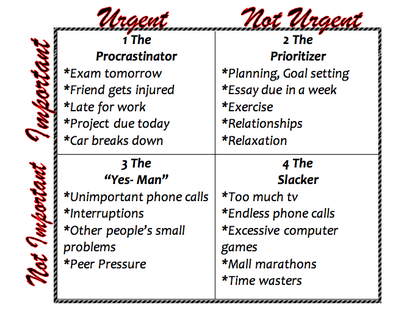
I have to say that I’ve always been really good at time management. I have a map of my week and know when certain tasks need to be completed. I then complete the tasks by order of importance and the time they need to be done. For example, if I know I have three blog posts that need to be done by Thursday but I know my week is filled with certain tasks that are not as important but still need to be done, I make time on my weekend to complete my blog posts since they are important. I always prioritize the tasks that have to be completed, and complete them in order of importance.
Steven Covey explains that there are four types of activities: important and urgent (quadrant 1), important and not urgent (quadrant 2), not important and urgent (quadrant 3) and not important and not urgent (quadrant 4). People that fall in quadrant 1 are procrastinators, people that fall in quadrant 2 are prioritizers, quadrant 3 are yes-men, and quadrant 4 are slackers. I would have to say I spend most of my time in quadrant 2. I am a prioritizer. I complete important things first by urgency, which means I tend to get things done way in advance. However, I do also tend to spend some time in quadrant 3 as a yes-woman. I often feel like I need to help others when they ask for it and complete those tasks first, even though I know it is not as important as some other tasks. This is what I need to work on. I get stuck completing tasks that are urgent but not important because other people ask me to. I can get bogged down with interruptions. I need to work on saying no. This has always been something that I have had to work on and I now know that a highly effective person spends more time on important tasks that are not urgent over non-important tasks that are urgent.
The other aspect of putting first things first that tends to get me into trouble is how task oriented I am sometimes. I am such a prioritizer with my school work and lesson planning that I tend to forget about relaxing and spending time with friends and family. Those tasks become unimportant when I have a lot of things to complete. I don’t think it should be this way. If you prioritize well enough, you should have time left to spend on non-work activities. Instead, if I complete a task early, I try to get started on the next task to get it done even earlier than I had planned. However, this is a vicious, never-ending cycle. There will always be something to work on that is considered important. I then become angry and frustrated that I work all the time and don’t have any time to relax or enjoy myself. Therefore, I need to strike a balance between being a prioritizing task-master and thinking I’m slacking if I’m not constantly working.
Therefore, the two aspects of time management that I need to work on to become more effective and increase my sphere of influence is setting aside non-important urgent tasks that others ask me to complete and also setting aside time once I’ve completed an important task early to relax and spend time with friends. It is a difficult balance to establish, but I’m glad I am working on this now before I take on any official leadership roles because having a healthy, balanced list of priorities is what will allow me to increase my sphere of influence as a leader.
I think this is a great concept to explain to my colleague, Courtney, as she completes her first year of teaching. She will need to prioritize her activities and complete the important tasks first before they become urgent so she does not end up feeling stressed to complete those tasks. I will also explain to her my tendencies and how I plan to work on them. This will also be good for me to explain to Courtney because if she asks me to help her with something unimportant and I say no, she will know I am working on being a highly effective person, instead of thinking I am not be helpful. We will help each other work on time management and focus our time on important non-urgent tasks first.